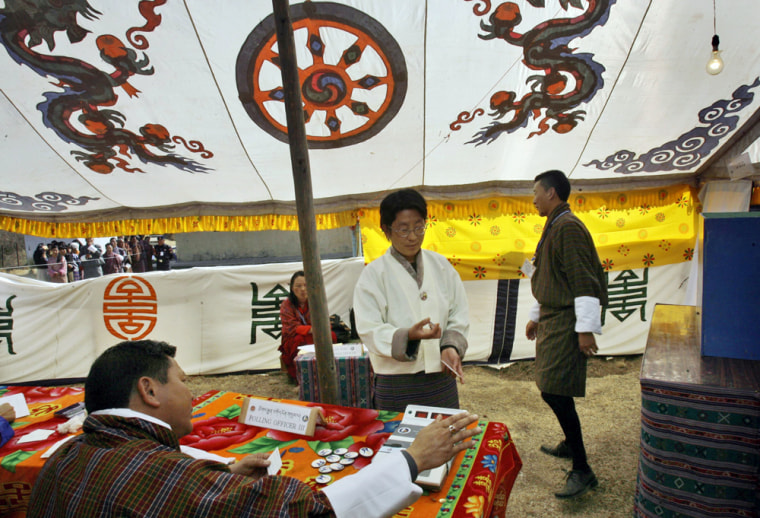Long known as a quirky holdout from modernity, the Himalayan kingdom of Bhutan ended a century of absolute monarchy Monday by electing a staunch royalist as its first prime minister.
So it goes in Bhutan, possibly the first country in history where a king had to convince his people that democracy was a good idea.
Known by its people as the Land of the Thunder Dragon, Bhutan’s snowcapped peaks and mountainside monasteries have long intrigued Westerners in search of a Buddhist nirvana. But the kingdom is, in many ways, a strikingly conformist place where the outside world is viewed warily and self-promotion and confrontation are frowned upon.
Just a few months ago, criticism of high officials was unimaginable to many here. Now they’re wondering what will become of their Precious Ruler as he gives up most of his power to politicians.
“There was much resistance when His Majesty told us that we must decide our future if Bhutan was to prosper,” said Karma Dorji, a 55-year-old civil servant waiting to vote in Thimphu, the capital.
That order came in late 2006, and Bhutan was already prospering. Its average annual of income of $1,400 was twice neighboring India’s, and nearly all its people had access to schools and hospitals, a rare achievement in this corner of the world.
Such success contrasts sharply with South Asian countries like Nepal or Bangladesh, which often seem like case studies in democracy gone wrong — a fact that left many here dreading the change.
'We prefer our king'But “we have come to see that this is an opportunity he has given us because he is farsighted and wise,” Dorji said. Still, he added, “We prefer our king.”
So does the new prime minister, Jigmi Kinley, who twice served as premier under royal rule. Kinley’s Bhutan Peace and Prosperity Party was considered the more royalist of the two very royalist political parties in Monday’s elections.
Kinley was celebrating his landslide — his party took 44 of the 47 parliament seats — in remote eastern Bhutan on Monday. The party’s spokesman, Palden Tshering, called the win a “victory for His Majesty.”
Kinley is likely to be named prime minister soon. The king, 28-year-old Jigme Keshar Namgyal Wangchuck, will remain head of state and likely retain much influence.
Kinley’s party, like the opposition, hews closely to the king’s vision. Both vow to follow the latest five-year plan — they call it “His Majesty’s vision” — and promote Gross National Happiness, an all-encompassing political philosophy that seeks to balance material progress with spiritual well-being.
Despite the near-identical ideologies, watching candidates drawn from the political elite compete has been baffling — and worrying — to Bhutanese.
“How does this end? Do we become India or worse, Pakistan? Are people going to riot every time a politician says so?” asked Phuntso Lhamo, a 23-year-old student, as she waited to vote in Thimphu.
That’s not likely. Bhutan’s election campaign was exceedingly mild by the standards of other democracies with candidates more likely to compliment competitors than criticize them.
But there were ugly moments. One party accused the other of vote buying (it was actually paying its workers); a candidate charged his opponent with trying to influence powerful monks by having his wife donate a butter lamp to a monastery.
'Get rid of these ghos'But in the political confrontations that so many find unseemly, others see an opening to be relished.
“Criticizing a minister, a civil servant. Can you imagine?” said Jitsen Dorji, a 32-year-old engineer. He said he hoped the democratically elected government would be more transparent.
He also had one other wish — “get rid of these ghos” — the traditional checkered robe Bhutanese men must wear to work. Women wear embroidered silk jackets and wraparound skirts.
That’s probably not going to happen. Bhutan’s monarchy, which only opened the country to the outside world in the early 1960s, has made a point of preserving Bhutanese culture in ways that seem heavy-handed to outsiders — and a few Bhutanese — such as the mandated dress code and not allowing television or the Internet in until 1999.
They also said they needed to protect their culture by driving out more 100,000 ethnic Nepalis — a Hindu minority concentrated in southern Bhutan — in the early 1990s. Most now live in refugee camps in Nepal and Bhutan refuses to take them back.
Even with tens of thousands of other ethnic Nepalis still in Bhutan, candidates were barred from speaking about matters of security or citizenship (that is, the refugees) as well as the royal family.
The Bhutanese say that such rules are needed to protect their tiny country, which lies between Asian giants India and China.
From medieval society to paved roadsIn the last half century, they’ve seen every other Himalayan Buddhist kingdom — places like Tibet and Sikkim — swallowed by foreign powers or swamped by outsiders.
While the Bhutanese insist they care little for such places — the recent unrest in Tibet, for instance, garnered little notice here — the country’s kings recognized in the 1960s that they needed to embrace the modern world to survive.
Back then Bhutan was a medieval society with no paved roads, no electricity and no hospitals. Almost no foreigners were let in.
Not anymore. The country is likely to soon join the World Trade Organization and it welcomes about 20,000 tourists a year, albeit on heavily supervised, expensive trips.
But on those tours — which almost always present the fairy tale version of Bhutan as a land of fortress-like monasteries where monks chant amid the riotous murals of temple walls — one can nonetheless get a sense of how tightly controlled Bhutan remains.
When one visitor ditched his guide to go for a walk around Thimphu, he barely made it two blocks before his mobile phone rang. “Where are you,” said his nervous guide. “I need to know where you are.”
